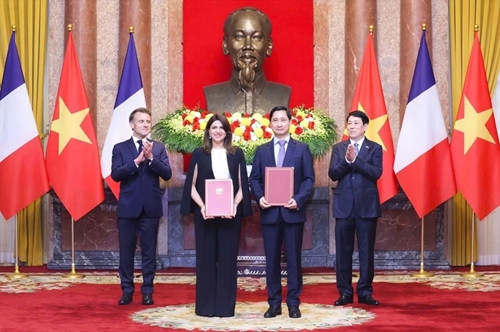The partnership marks a significant milestone in enhancing bilateral cooperation in key sectors amid globalization, especially in healthcare. It also represents a strategic step for Vietnam’s health sector to expand international collaboration in high-tech science, aiming to reinforce national health security and boost its preparedness for future disease outbreaks.
    |
 |
|
After the talks, President Luong Cuong (first, right) and French President Emmanuel Macron (first, left) witness the exchange of cooperation documents between leaders of ministries, agencies, and enterprises from both countries. |
Under the agreement, VNVC and Sanofi will gradually implement technology transfers to enable domestic production of several key Sanofi vaccines that are widely used in Vietnam. In addition, Sanofi will support VNVC in training human resources and quality management in vaccine research and manufacturing.
Ngo Chi Dung, General Director and Chairman of VNVC, spoke highly of the significance of the deal in strengthening Vietnam’s vaccine production capabilities.
He noted that, as the government is promoting the development of the private sector and international cooperation in science and technology, the partnership with Sanofi will allow VNVC in particular, and the domestic vaccine industry in general, to rapidly scale up manufacturing and produce high-quality vaccines that meet global standards.
The collaboration is expected to give Vietnam rapid access to cutting-edge technologies, optimize R&D efforts, and ensure timely domestic supply, thus contributing significantly to national health security.
According to Dung, Sanofi currently supplies Vietnam with tens of millions of high-quality vaccine doses annually for private immunization programs. These include Hexaxim (6-in-1), Tetraxim (4-in-1), Adacel (for diphtheria, pertussis, and tetanus), Imojev (Japanese encephalitis), Verorab (rabies), Menactra (meningococcal meningitis), Avaxim (hepatitis A), Vaxigrip Tetra (influenza), and Typhim VI (typhoid).
Once these vaccines are produced domestically, they are expected to be more affordable and widely available, improving immunization access for both children and adults.
As part of its strategic vision for vaccine self-reliance, VNVC is currently developing a state-of-the-art vaccine and biologicals plant in the Mekong Delta province of Long An.
Covering 26,000 square meters, the factory is being built with an initial investment of 2 trillion VND (78.7 million USD) and is designed to meet the highest Good Manufacturing Practices (GMP) standards set by the World Health Organization (WHO), the European Union (EU), and the United States Food and Drug Administration (FDA).
Source: VNA